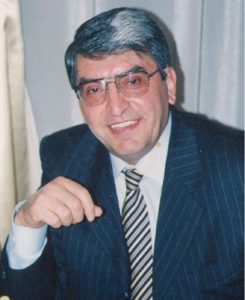Mirror-Spectator Staff
WASHINGTON — Varazdat Avoyan joined the Armenian Democratic Liberal Party (ADL) in 1991, and soon became one of its most prominent leaders in the Armenian parliament. A native son of Shirak province, he personally suffered a tragic loss during the 1988 earthquake in Armenia. Afterwards he dedicated much of his life to remedying the destruction in his native region.
Avoyan was born in Medz Sariar village of Shirak province, Armenia, in 1947. He graduated from the Mikayel Nalbandian Pedagogical Institute of Gumri (called Leninakan in the Soviet period) in 1969, specializing in teaching and psychology. From 1970, he worked as a journalist, secretary of the Communist Youth League of the Pedagogical Institute, agent of the City Committee of the Communist Party and director of the Gumri city council’s culture department. He rose high in the political system in Gumri, which is the second largest city in Armenia. One of its major sections is called Moskovyan. From 1985 to 1990 Avoyan served as the Second and then the First Secretary of the Moskovyan District Committee of the Armenian Communist Party.
In 1988 he lost his wife to the terrible earthquake of December 7, and henceforth raised his sole daughter alone. Avoyan said during a recent visit to Washington, DC that “the events of the 1980s and our most important movement, the Karabagh movement, brought a new spirit to our national ideology. At the same time, the main figures in the former order shared the common concern that during the general collapse of the Soviet Union Armenia should not fall underneath the rubble. Very careful and precise policies were necessary to get Armenia safely through this period, and generally this was accomplished.”
During elections to the Supreme Soviet of the Republic of Armenia in 1990, which was to become the first parliament of an independent Armenian republic, Avoyan’s candidacy was proposed by his colleagues. He won a seat from Gumri’s Veratsnund (“Renaissance”) 91st Electoral District. Avoyan was one of the first parliament deputies to join the ADL once it became an officially registered political party.










